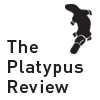A moderated panel discussion hosted by the Platypus Affiliated Society held on Friday, May 24, 2013 at the Eyelevel Gallery in Halifax.
In conjunction with the Annual Y-Level Exhibition ("And all sat mute")
Please Note: Due to technical problems, the ending of the event for both audio and video is cut off.
Description:
If it is true that the 'commodity-structure' (Lukacs) is the defining feature of modern capitalism down through the present, then it stands to reason that it has no less impacted the way art is produced, consumed, circulated, and exchanged. This shift in art's character happened both objectively (e.g., as in an article produced for exchange on the market), and subjectively (i.e., as a kind of experience and form of expression for the social and individual body). However, art's relationship to its status as a commodity is an ambivalent one: Art has become at once more free from past forms of domination, but its freedom is constrained when subject to the dynamics of capital. Art as a commodity is both its cure and poison, and has become a social problem for its practice. Since becoming aware of this problem, artists, philosophers, curators, and critics have taken various approaches in seeking to overcome it.
How has art under a capitalist society changed from its pre-capitalist practices? What is the commodity-form, and what is art's relationship to its logic? Must art seek emancipation from the commodity-form, or is it at home in it? In what sense does art take part in the Left and emancipatory politics -- a practice also seeking to overcome the commodity-form -- if at all? By asking these questions, this panel seeks to reinvestigate art's relationship to the commodity form, and make intelligible how this problematic relationship still sticks with us today.
Panelists:
Merray Gerges
Jocelyn Li
Jakub Milčák
Beck Gilmer-Osborne
Video will be forthcoming!
A panel event held in Chicago at the University of Chicago on May 6, 2013.
Transcripted in Platypus Review #57 (Click on banner to see):

The reelection of Obama presented a problem for the American left. Lost was the hopeful rhetoric of transforming society for the better, and as it became clear that Obama’s administration had returned to “politics-as-usual,” the left began to cynically appraise the purported gains made in his first term. Not the least of these was the claim that we live in a “post-racial” society. From Abolitionism to the Civil Rights Movement, the issue of racism was and is a defining one for the American left. As social life in the United States has reproduced itself through various social and ideological transformations, racism seemed always to reproduce itself in and through those transformations. And, surely not without merit is the contemporary left’s skepticism regarding America’s supposed achievement of a “post-racial society.” Yet, any talk of race in the current age must account for the fact that America’s first black president was twice elected by substantial margins. If anti-Black racism subsists, it clearly does not have the same relationship it once did to capitalism and society in general. This panel will investigate the how the left understands the concept of race in contemporary politics, and how this concept can, should, or will maintain of political significance for a future renascent left.
Featuring:
Michael Dawson
Cedric Johnson
Transkript in Platypus Review #63 (Englisch)
Seit der Machtergreifung der Nationalsozialisten vor achtzig Jahren, gehört der Antifaschismus zu einem Kernelement linker Politik. Der Kampf gegen Faschisten und Nazis ist eine moralische Selbstverständlichkeit und so scheint auch das Konzept von Antifaschismus als Politik einen selbstevidenten Charakter zu haben.
Doch in den verschiedenen Phasen war der Kontext antifaschistischer Politik ein völlig anderer, ebenso wie die Vorstellung dessen, was Antifaschismus im Hinblick auf eine linke Politik beizutragen habe. Dennoch lässt sich über die ständige Referenz und dem antikapitalistischen Anspruch eine gewisse Kontinuität feststellen. Doch woher kommt diese? Was war der Antifaschismus und wie hat er sich geändert? Inwiefern hilft der Begriff bzw. das Konzept des Antifaschismus bei dem Verständnis der historischen und gegenwärtigen Realitäten? Was bedeutet eine antifaschistische Politik heute – in der Abwesenheit des Faschismus als politischer Massenbewegung? Die Podiumsdiskussion möchte die unterschiedlichen historisch-politischen Implikationen antifaschistischer Politik thematisieren um somit grundlegende Fragen und Probleme linker Politik in der Gegenwart aufzuwerfen.
- Jan Gerber (Buchautor bei Ca-Ira, Halle)
- Manuel Kellner (ISL, Köln)
- Henning Mächerle (VVN-BdA, Gießen)
- Wolf Wetzel (ehem. autonome L.U.P.U.S.-Gruppe)
[vimeo https://vimeo.com/64377736]
A panel event held at New York University on April 18th, 2013.
Transcripted in Platypus Review #57 (Click on banner to see):

Recently, a series of exchanges between the Communist Party of Great Britain (PCC), the International Bolshevik Tendency, and the Platypus Affiliated Society has unfolded, mapping a field of positions and historical perspectives whose contours trace some of the most provocative contemporary perspectives on Marxism, socialism, and democracy.
With this public forum speakers will take stock of the points of convergence and divergence that have emerged in order to push the conversation further on key issues such as Left unity, neo-Kautskyism, factionalism, Trotskyism, sectarianism, Leninism and Bolshevism, democratic organization and political program. The event will feature:
James Turley (CPGB)
Bhaskar Sunkara (Jacobin)
Benjamin Blumberg (Platypus)
Please see the link below for a helpful compilation of debates between the Communist Party of Great Britain (PCC), the International Bolshevik Tendency, and the Platypus Affiliated Society.
The full compilation may be found here.
A plenary presentation by Chris Cutrone, Spencer Leonard, and Richard Rubin, delivered on April 7th, 2012 as part of the 2013 Platypus Affiliated International Convention held at the School of the Art Institute of Chicago, upon the trajectories of their personal political development that led to Platypus.

